HRC56: Significant Implications of Climate Change on the Enjoyment of Human Rights
The 56th Session of the Human Rights Council
18 June - 12 July 2024
Item 3: Interactive Dialogue with the Special Rapporteur on Promotion and Protection of Human Rights in the Context of Climate Change.
2 July 2024
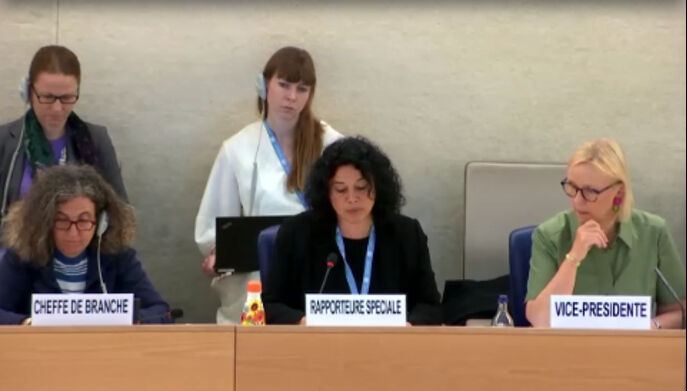
By Teboho Mosebo / GICJ
Executive Summary
On 2 July 2024, the 21st meeting of the 56th Session of the Human Rights Council considered the report of Ms. Elisa Morgera, the Special Rapporteur (SR) on the promotion and protection of human rights in the context of climate change.
This was Ms. Morgera’s first thematic report and it illustrated the legal efforts undertaken to clarify climate change related issues and obligations made by the Special Procedures and Treaty Bodies. She observed that not enough has been and is currently being done to address climate change driven challenges. She recalled that were it not for the heat absorbed by the oceans between 1971 and 2010, the atmosphere would be hotter by 36 degrees.
Her report presented key areas of action that need to be explored in order to mitigate the impact of climate change, such as adaptation, just transition, climate finance and loss and damage. In regards to mitigation strategies, she indicated that the major areas of concern have been identified in fossil fuels, coal, and other energetic sources. She then emphasised that climate finance needs to be made reliable to ensure protection of human rights, while being directly accessible for the most vulnerable affected persons.
Moreover, the Special Rapporteur called for the monitoring of business enterprises to prevent repeating practices that have proved to be ineffective in tackling climate change. Ms. Morgera stated that a genuine opportunity to be appropriately represented and participate in decision making processes needs to be awarded to all persons and stakeholders, especially those in situations of vulnerability.
Numerous delegations expressed strong support for the Special Rapporteur's mandate and her efforts in tackling human rights violations associated with ineffective response to climate change. However, concerns were raised about unresolved issues, especially affecting the most vulnerable communities, developing countries, women and children, LGBTI persons, and persons with disabilities. Many civil society groups welcomed the report's emphasis on intersectionality and called for adequate financing for climate action measures. They further called on States to acknowledge the danger and risks of climate change and consider the application of the SR’s recommendations. NGOs, on the other side, encouraged States in order to adopt concrete laws and policies with the aim to reduce the impacts associated with climate change and to protect human rights.
Background
Since the creation of the mandate of the Special Rapporteur on the promotion and protection of human rights in the context of climate change in 2021, three thematic reports were completed out of the six priority areas highlighted by the previous mandate holder (A/HRC/50/39): (a) protection of human rights in the context of climate change mitigation, adaptation and financial actions, with emphasis on loss and damage; (b) human rights implications of climate change displacement; and (c) climate change legislation, support for climate change litigation and advancement of the principle of intergenerational justice. The following priorities have remained unaddressed: (d) corporate accountability with respect to human rights and climate change; (e) protection of human rights through just transition; and (f) exploration of the impacts of new mitigation technologies on human rights.
The second mandate holder, Ms. Elisa Morgera, took office on the 1st of May 2024, a month and a half before the submission of her first thematic report. Considering the fast-moving landscape over the last five years, the report mapped efforts made in clarifying human rights issues and obligations in relation to climate change in international human rights processes.
Moreover, considerable work has been, and is currently being undertaken by other human rights mechanisms, with respect to climate change and unprecedented ruling on the impacts of climate change. Lastly, the International Law Commission is undertaking work on sea-level, and three Advisory Opinions have been requested to clarify international obligations related to climate change, to the International Tribunal for the Law of the Sea (ITLOS), the International Court of Justice (ICJ), and the Inter-American Court of Human Rights (IACHR).
Report of the Special Rapporteur on climate change
Ms. Morgera’s first thematic report mapped criticalities and provided significant guidance on human rights issues and applicable International human rights law obligations in relation to climate change mitigation, including the use of technology and carbon credits, adaptation, just transition, finance, and loss and damage. The Special Rapporteur highlighted in her report that she collaborated with various Special Rapporteurs and Treaty Bodies. The report stressed the importance of adopting an intersectional approach for the promotion and protection of human rights in the context of climate change.
The Special Rapporteur emphasised that mitigation duties entail the obligation to take effective measures to prevent foreseeable harm to human rights caused by climate change. Mitigation actions that were singled out across human rights processes were in the areas of fossil fuel, coal, energy efficiency, nature conservation, and food systems. In the report, a group of Special Rapporteurs called for the regulation of businesses' emissions under national jurisdictions and ensuring enforcement by national courts. On the other hand, a call was made for the prohibition of further exploration for additional fossil fuels, rejecting any other expansion of fossil fuel infrastructure, and immediate termination of all fossil fuel subsidies.
Concerning carbon credits, the report indicated that natural-based carbon credits have been associated with widespread displacement, increased human rights harm, and increased risk for people whose livelihoods depend on nature, including Indigenous Peoples. A group of Special Rapporteurs supported the establishment of a market-based mechanism to assign carbon credits, and for the adoption of effective measures for protecting human rights and effective compliance as well as redress mechanisms, including mandatory environmental and human rights diligence and policies.
Moreover, Ms. Morgera clarified that climate adaptation entails adjustment in ecological and socioeconomic systems to respond to current and future effects of climate change. Lack, delay or inadequacy of adaptation strategies was qualified as a violation of human rights. The report emphasised that States should implement measures through inclusive, participatory processes, informed by representatives of affected communities. The Special Rapporteur reiterated the importance of implementing national adaptation plans to address both extreme weather disasters and slow-onset events, by building or upgrading upon existing climate-resilient infrastructures, developing disaster risk reduction and management strategies, and creating early warning systems and emergency response plans.
The report discussed three obligations in relation to climate finance: (1) The obligation for developed States to provide sufficient finance to ensure protection of human rights from climate change negative impacts; (2) the obligation to sett priorities and enable direct access to international funding for the most vulnerable human rights holders; (3) the obligation to prevent negative impact on human rights from funded projects, including through the adoption of appropriate safeguards. On sufficient climate finance, the Special Rapporteur on the Right to a Healthy Environment called for a global carbon tax, with a floor price per ton for developing States and a higher floor price for developed States.
The report indicated that recent estimates of climate change indicate that in 2022 developed States provided and mobilised a total of $115.9 billion (USD), of which $91.6 billion went into public finance. The issue of international support for finance was strongly reiterated and recommended by many delegates.
Finally, the Special Rapporteur referred to climate-related loss and damage as one of the key effects of climate change that occur despite adaptation and mitigation efforts. The report highlighted loss of lives, and harm to human health, land and ocean territories as essential factors to tackling climate issues. It emphasised that harm and damage requires being addressed from a human rights perspective, which includes the award of reparations to the affected communities, encompassing restitution, compensation and rehabilitation. Financial support was a crucial point raised, with recommendations including: the providing of funds by developed countries to cover for loss and damage that adequately accommodate vulnerable communities and low-income States; the prioritisation of grants over loans, to avoid aggravating the public debt of recipient States.
Interactive Dialogue
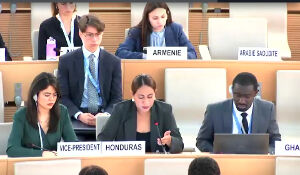 The Representative of Honduras recognised the significance of tackling the climate change crisis on a granular level. According to the delegate, they are working towards sustainable development models that encourage the wise use of natural resources. Furthermore, by implementing preventative and protective measures to deal with these issues, Honduras reaffirmed its commitment to the responsible management of climate change and the displacement caused by natural catastrophes.
The Representative of Honduras recognised the significance of tackling the climate change crisis on a granular level. According to the delegate, they are working towards sustainable development models that encourage the wise use of natural resources. Furthermore, by implementing preventative and protective measures to deal with these issues, Honduras reaffirmed its commitment to the responsible management of climate change and the displacement caused by natural catastrophes.
The Delegate of Honduras further emphasised that although highly industrialised nations account for the majority of global pollution, developing nations bear the brunt of the consequences of climate change. In order to rebuild its environment after past environmental devastation, the nation has put in place national security measures related to climate change adaptation and mitigation. Finally, Honduras called for a multifaceted approach to undertake these actions and reaffirmed its steadfast commitment to implement the Special Rapporteur's recommendations.
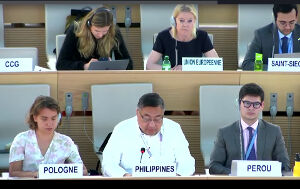 The Delegate of Philippines stated that while their country contributes the least to global greenhouse gas emissions, it carries the most responsibility for the climate change catastrophe. Typhoons, heat waves, and droughts, according to the delegate, are the source of their misery. He went on to say that between 2011 and 2021, the Philippines lost over $11 billion due to typhoons alone.
The Delegate of Philippines stated that while their country contributes the least to global greenhouse gas emissions, it carries the most responsibility for the climate change catastrophe. Typhoons, heat waves, and droughts, according to the delegate, are the source of their misery. He went on to say that between 2011 and 2021, the Philippines lost over $11 billion due to typhoons alone.
Moreover, the country has established national rights strategies that focus on climate change and stated that it aims for climate resiliency and sustainable development that benefits everyone. Lastly, the Philippines reiterated its readiness to work with other stakeholders to exercise the highest standards for objectivity in climate change action.
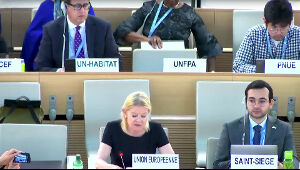 The Delegate of the European Union reaffirmed the EU’s support for the Special Rapporteur's mandate. She emphasised that, despite the huge and far-reaching implications of climate change for human rights, more work needs to be done to translate commitment into policies and activities that prioritise human rights. She proceeded to underscore that the UN system's extensive findings and suggestions should play an important role in promoting evidence-based international policymaking.
The Delegate of the European Union reaffirmed the EU’s support for the Special Rapporteur's mandate. She emphasised that, despite the huge and far-reaching implications of climate change for human rights, more work needs to be done to translate commitment into policies and activities that prioritise human rights. She proceeded to underscore that the UN system's extensive findings and suggestions should play an important role in promoting evidence-based international policymaking.
Moreover, the EU welcomed advancement into intersectionality in climate action, with prime attention to the most affected, including women and girls, indigenous people and persons in vulnerable situations. The delegate also emphasised how it is essential to ensure meaningful participation of these persons as well as environmental defenders. Lastly, she asked the SR to highlight concrete measures by States that could be key to ensuring intersectionality across climate change action.
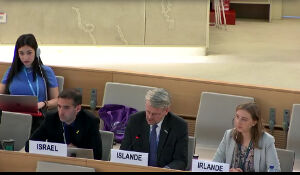 The Delegate of Island, on behalf of the Nordic and Baltic countries’ group, expressed strong support for the SR’ mandate. The delegate labelled climate change as one of the greatest threats to human rights of all time. He further contended how climate change disproportionately impacts women and children and vulnerable groups already at risk, including Indigenous people, LGBTI persons and persons with disabilities. He emphasised that it is crucial to adopt a human rights-based approach in order to address the impacts of climate change. He reiterated that accessible financial support is pivotal to mitigate physical constraints, reduce deaths and overcome barriers to renewable energy and workplace development. Lastly, he stated that the Nordic and Baltic countries as a group are committed to seek guidance on best practices for intersectional climate action.
The Delegate of Island, on behalf of the Nordic and Baltic countries’ group, expressed strong support for the SR’ mandate. The delegate labelled climate change as one of the greatest threats to human rights of all time. He further contended how climate change disproportionately impacts women and children and vulnerable groups already at risk, including Indigenous people, LGBTI persons and persons with disabilities. He emphasised that it is crucial to adopt a human rights-based approach in order to address the impacts of climate change. He reiterated that accessible financial support is pivotal to mitigate physical constraints, reduce deaths and overcome barriers to renewable energy and workplace development. Lastly, he stated that the Nordic and Baltic countries as a group are committed to seek guidance on best practices for intersectional climate action.
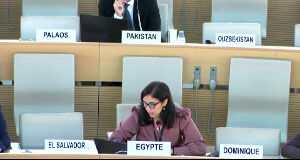 The Delegate of Egypt, on behalf of the Arab Group, welcomed the report and took note of its recommendations, especially mitigation and adaptation approaches. The delegate took an opportunity to reaffirm the importance of sufficient international support to developing countries, in order to carry out these measures. She also underlined the importance for developed countries to fulfil thir responsibilities in accordance with the United Nations CCC and Paris Agreement, including financing, capability building and training to help developing countries to carry out these essential transformations. In conclusion, the Delegate shed light on the situation faced by the citizens of the Gaza strip, following genocide, war crime and crimes against humanity by the occupying power.
The Delegate of Egypt, on behalf of the Arab Group, welcomed the report and took note of its recommendations, especially mitigation and adaptation approaches. The delegate took an opportunity to reaffirm the importance of sufficient international support to developing countries, in order to carry out these measures. She also underlined the importance for developed countries to fulfil thir responsibilities in accordance with the United Nations CCC and Paris Agreement, including financing, capability building and training to help developing countries to carry out these essential transformations. In conclusion, the Delegate shed light on the situation faced by the citizens of the Gaza strip, following genocide, war crime and crimes against humanity by the occupying power.
The Representative of United Nations Women commended the report's focus on intersectionality and gen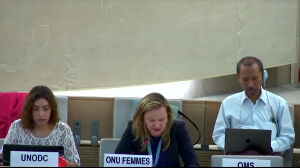 der-sensitive approaches. She emphasised that climate change, in certain circumstances, particularly affects women. The Delegate further argued that it impinges on gender and equality and threatens women's and girls' livelihoods and also increases the risks of conflict and gender based violence as well as undermining women's health.
der-sensitive approaches. She emphasised that climate change, in certain circumstances, particularly affects women. The Delegate further argued that it impinges on gender and equality and threatens women's and girls' livelihoods and also increases the risks of conflict and gender based violence as well as undermining women's health.
To address these gender-specific aspects, UN Women works across its mandate, deploys experts and liases between the UN systems, governments and civil society in areas aligned with the Special Rapporteur's mandate, including gender responsive decisions and climate finance. The UN Women Representative finally emphasised that women and girls must enjoy equal rights as men.
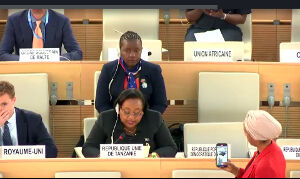 The Delegate of Tanzania reiterated its commitment to promote clean energy initiatives. As a measure to mitigate challenges of climate change which have emerged as a fundamental human rights issue, clean energy programs have been established to support women in particular. The Delegate further indicated that at the national level, the National Clean Cooking Strategy of 2024-2034 is being implemented to provide guides on the use of this strategy. Lastly, the Tanzanian Delegate emphasised that the strategy is relevant as it will address the environmental degradation and climate change impacts associated with the traditional use of wood and charcoal cooking methods.
The Delegate of Tanzania reiterated its commitment to promote clean energy initiatives. As a measure to mitigate challenges of climate change which have emerged as a fundamental human rights issue, clean energy programs have been established to support women in particular. The Delegate further indicated that at the national level, the National Clean Cooking Strategy of 2024-2034 is being implemented to provide guides on the use of this strategy. Lastly, the Tanzanian Delegate emphasised that the strategy is relevant as it will address the environmental degradation and climate change impacts associated with the traditional use of wood and charcoal cooking methods.
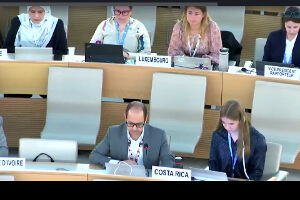 The Delegate of Costa Rica highlighted that the ocean is one single interconnected body of water, which unites, sustains and connects and is essential for survival of the ecosystem, people and communities. As Costa Rica, they acknowledged that a healthy ocean is instrumental for full enjoyment of a variety of human rights, including the right to life, health, work, food and housing. The Delegate alluded to the fact that many Indigenous people as well as local communities have cultural practices and traditions that are deeply connected to the ocean. As a result, they expressed concern over the current and projected effects of climate change on the marine environment and ecosystem and emphasised the urgency of addressing these to protect human rights.
The Delegate of Costa Rica highlighted that the ocean is one single interconnected body of water, which unites, sustains and connects and is essential for survival of the ecosystem, people and communities. As Costa Rica, they acknowledged that a healthy ocean is instrumental for full enjoyment of a variety of human rights, including the right to life, health, work, food and housing. The Delegate alluded to the fact that many Indigenous people as well as local communities have cultural practices and traditions that are deeply connected to the ocean. As a result, they expressed concern over the current and projected effects of climate change on the marine environment and ecosystem and emphasised the urgency of addressing these to protect human rights.
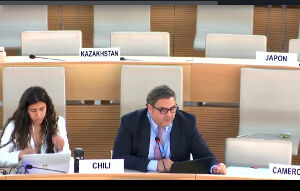 The Delegate of Chile also welcomed the report, especially its focus on human rights obligations in the fight against climate change measures, especially intersections which ensure policy consistency and international cooperation. He confirmed the country’s commitment to adopt mitigation measures, aligning with the international framework, as well as to gradually reducing the use of fossil fuels and the promotion of energy efficiency. The Delegate highlighted the need for adequate financing to protect the rights of individuals from the adverse impact of climate change and emphasised that it must be predictable and adequate. Finally, he reiterated Chile’s commitment to tackle climate action from a human rights perspective.
The Delegate of Chile also welcomed the report, especially its focus on human rights obligations in the fight against climate change measures, especially intersections which ensure policy consistency and international cooperation. He confirmed the country’s commitment to adopt mitigation measures, aligning with the international framework, as well as to gradually reducing the use of fossil fuels and the promotion of energy efficiency. The Delegate highlighted the need for adequate financing to protect the rights of individuals from the adverse impact of climate change and emphasised that it must be predictable and adequate. Finally, he reiterated Chile’s commitment to tackle climate action from a human rights perspective.
The Delegate of Zambia welcomed the insightful report and accepted mitigation and adaptation strategies as essential to reducing the risks associated with climate change. The Delegate expressed support for a human rights-centred appr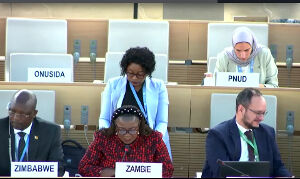 oach to mitigation and adaptation, crucial to build a climate-resilient future. She pointed out that her country is currently affected by severe drought caused by the El Nino and influenced by climate change and that the President even declared drought as a national disaster on the 29th of February 2024.
oach to mitigation and adaptation, crucial to build a climate-resilient future. She pointed out that her country is currently affected by severe drought caused by the El Nino and influenced by climate change and that the President even declared drought as a national disaster on the 29th of February 2024.
Moreover, the Zambian government has formulated the response strategy to provide lifesaving assistance and to strengthen resilience to droughts. She made reference to technology and noted that it is beneficial to mitigate climate change through various innovations, including the provision of clean energy sources. However, the Delegate urged States to ensure that technology is utilised in a manner that protects human rights. Lastly, she asked how States can ensure that national policies for mitigation and technology remain relevant with rapid changes of new technologies.
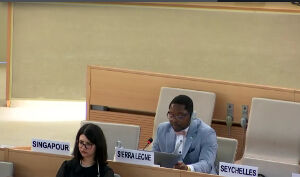 The Delegate of Sierra Leone aligned with the statement of the African Group. The Delegate highlighted that Sierra Leone, as a developing country, is disproportionately impacted by climate change, which impinges on food security and on the livelihoods of the majority of the population.
The Delegate of Sierra Leone aligned with the statement of the African Group. The Delegate highlighted that Sierra Leone, as a developing country, is disproportionately impacted by climate change, which impinges on food security and on the livelihoods of the majority of the population.
The Delegate mentioned how the country is facing extreme weather, heatwaves and events such as floods, landslides and rising sea levels which affects coastal communities. In response to these challenges, Sierra Leone has implemented policies and climate actions, including a National Action Plan on UNFCCC. Finally, the Delegate emphasised that tackling climate change requires efforts by the international community to have global cooperation.
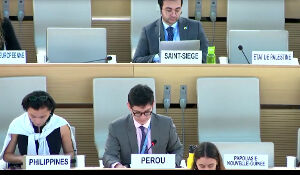 The Delegate of Peru welcomed the fact that the Special Rapporteur prioritised intersectionality and comprehensive cooperation in human rights approaches to climate change. The Delegate said the country had observed more frequent and severe weather events affecting people, especially in vulnerable situations. Peru believed it is important to address the link between the impacts of climate change and human health. Additionally, he called for more resilient and adaptive measures to tackle climate change.
The Delegate of Peru welcomed the fact that the Special Rapporteur prioritised intersectionality and comprehensive cooperation in human rights approaches to climate change. The Delegate said the country had observed more frequent and severe weather events affecting people, especially in vulnerable situations. Peru believed it is important to address the link between the impacts of climate change and human health. Additionally, he called for more resilient and adaptive measures to tackle climate change.
In conclusion, he encouraged the Special Rapporteur to pay special attention to the link between climate change and human health.
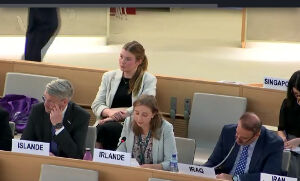 The Delegate of Ireland supported the statement of the EU Representative and thanked the SR for her report. She emphasised that climate action is a core priority to them and agreed that intersectionality in human rights approach is essential to protect those in vulnerable situations from adverse effects of climate change. The Delegate stated that they are working to support International recognition of the right to safe, clean, healthy and sustainable development.
The Delegate of Ireland supported the statement of the EU Representative and thanked the SR for her report. She emphasised that climate action is a core priority to them and agreed that intersectionality in human rights approach is essential to protect those in vulnerable situations from adverse effects of climate change. The Delegate stated that they are working to support International recognition of the right to safe, clean, healthy and sustainable development.
Moreover, the Representative highlighted that adaptation is central to Ireland climate change action, which prioritises funding for solutions that reduces vulnerability in an equitable manner, including through protection and restoration of natural ecosystems and early warning systems. In addition, Ireland prioritises funding for initiatives that work to minimise and address loss and damage, including by strengthening social protection systems and climate risk mechanisms. Lastly, the Delegate reaffirmed they will continue to support the human rights defenders, women and girls and the marginalised groups.
Closing Remarks
The Special Rapporteur thanked all the delegates who supported her mandate, especially her initial idea of a sector-to-sector approach. She emphasised that taking a sectoral approach is important for a number of reasons: it plays a vital role in legislation-drafting, safe climate and economic activities. This approach will allow Ms. Morgera to analyse in depth various scenarios, including the regulation and monitoring of business enterprises, by equally and further understanding the stability of businesses to respect human rights.
Furthermore, the Special Rapporteur argued, within the context of human rights, that it would be important to address several areas of international law. She recommended engagement with the protection of children rights, health and environmental rights and most importantly international economic law. Ms. Morgera thanked her colleagues for considering the ‘intersectionality guidance’ and expressed her wish to continue collaborating with them..
Moreover, she reminded the delegates about how taking too narrow measures to mitigation and adaptation of climate change has led to violations of human rights. She also confirmed the commencement of dialogues with the newly appointed Special Rapporteur on the human rights to environment and express hope for valid contributions going forward. Lastly, the Special Rapporteur recommended States to individually and genuinely engage with lived experiences and distribute knowledge through international cooperation, apply international guidance on intersectionality in developing, implementing, funding, monitoring, evaluating, learning from and reviewing climate action at all levels.
Position of Geneva International Centre for Justice (GICJ)
Geneva International Centre for Justice congratulates the Special Rapporteur on her first thematic report and wishes her success going forward. GICJ echoes the Special Rapporteur’s emphasis on the issue of intersectionality in climate change action. However, it remains deeply concerned by the stance of those States that are not sufficiently engaged to combat climate change and calls on them to respect their obligations under international law. Climate change causes the displacement of vulnerable populations and deprives them of their rights. It is essential to implement the recommendations put forth by the Special Rapporteur, tackling interrelated issues through an intersectional approach. Only this can prevent further discrimination derived from climate change.
#ClimateChange #SpecialRapporteur #Honduras #Philippines #Mitigation #Intersectionality #HumanRights #Geneva #geneva4justice #GICJ #Internaional_Centre_for_Justice




